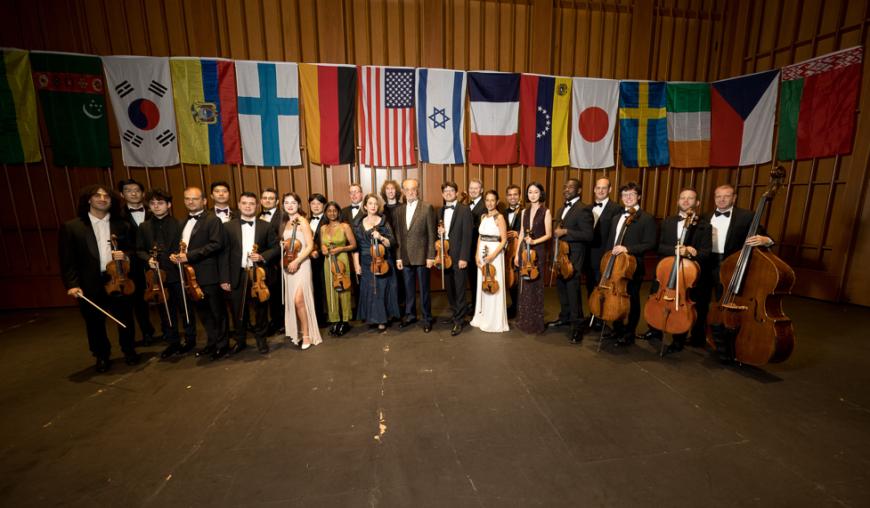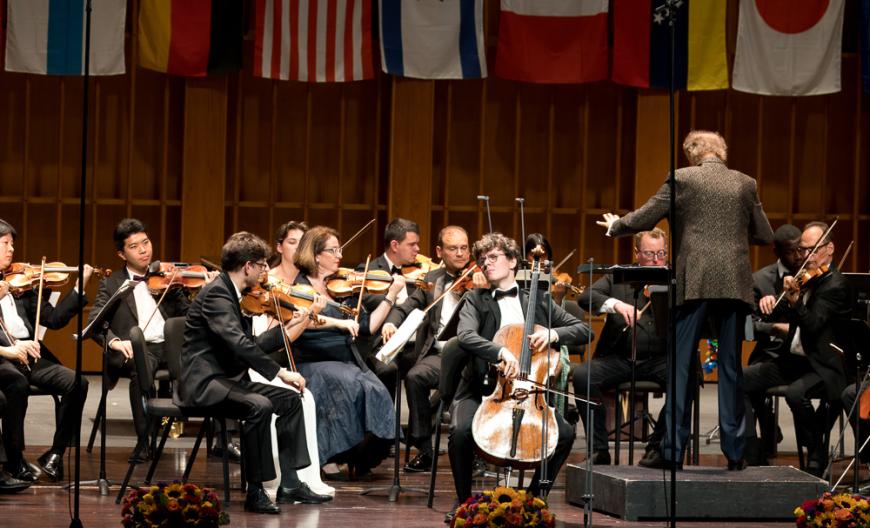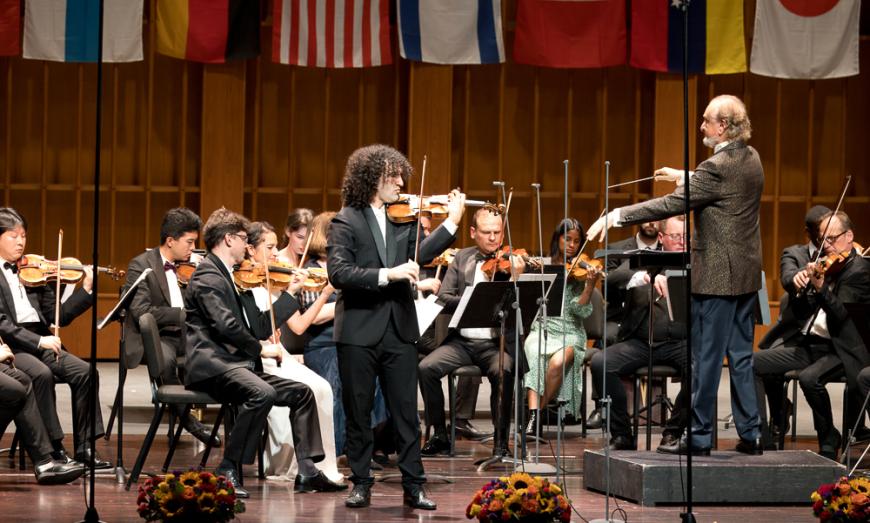
The array of national flags that draped the stage of Ambassador Auditorium in Pasadena on Saturday for the final concert of iPalpiti’s weeklong 27th annual Festival of International Laureates was worthy of the Olympics.
Themed “On Wings of Peace,” the concert was led by conductor and violinist Eduard Schmieder. Born in 1948 in Lviv, Schmieder founded the festival in 1997 with support from his friend and fellow violinist Yehudi Menuhin, the stated mission being to advance the careers of young, post-conservatory musicians from around the world. And many of those musicians continue to come back to perform with the iPalpiti Orchestra.
This year’s festival was again a parade of nations, with the musicians hailing from Germany, Ireland, Japan, Italy, France, Finland, India, Turkmenistan, Korea, Belarus, Ecuador, the Czech Republic, Israel, China, Venezuela, and Lithuania as well as the United States.
Since its creation, iPalpiti (the name the organization adopted in 2008) has awarded scholarships to over 400 candidates from 54 countries, presented over 600 concerts (nationally and on international tours), produced 25 recordings, and been the subject of three documentaries.

The organization also has deep Jewish (particularly Russian Jewish) roots. And on Saturday, the ongoing conflict in Gaza was on the minds of many in the audience and a definite point of focus, with the flags of Israel and the United States placed prominently side by side at center stage.
“This performance is dedicated to the victims of Oct. 7,” Schmieder said solemnly as he introduced a performance of Israeli composer Mark Kopytman’s Kaddish (1982), with Vilém Vlček as the sonorous cello soloist.
“This is dedicated to my parents,” Schmieder said of Syrian composer Kareem Roustom’s Three Klezmer Dances (2008), which featured Davide De Ascaniis as a most flamboyant violin soloist.
“I don’t think I need to tell you what this music is. You will definitely know it,” Schmieder said before leading an encore performance of John Williams’s Theme From Schindler’s List, the wistful violin part performed by Liza Kerob, concertmaster of the Orchestre Philharmonique de Monte Carlo and a festival alumna.
The concert opened with the sole surviving movement of Felix Mendelssohn’s String Symphony No. 10 in B Minor, 11 minutes long and composed at the age of 14. The performance — adroitly guided by iPalpiti’s concertmaster of 30 years, Peter Rainer — alternated between dulcet, creamy sonorities and youthful Mozartian energy.

The first soloist of the evening was the long and lanky American pianist Michael Davidman, who delivered a virtuosic rendition of Joaquín Turina’s Rapsodia sinfónica (1931). With sting-like-a-bee flair, Davidman captured the work’s cinematic portrait of Turina’s birthplace, Seville, with its traditions of flamenco and bullfighting. Throughout the 10-minute performance, the orchestra provided colorful accompaniment, the music ebbing and flowing between Spain and Hollywood.
It was impossible not to be moved by the deep emotionality and tragedy reflected in Vlček’s gravely powerful rendition of Kopytman’s Kaddish. The orchestra also clearly felt deeply about the piece, and together, the musicians created the most impressive performance of the concert.
In contrast, De Ascaniis’s performance of Roustom’s Three Klezmer Dances combined the rambunctious dancing spirit of a Jewish wedding with an abundance of heart-on-sleeve schmaltz.
When you attend a performance by iPalpiti, it’s instantly clear that the orchestra and its one and only conductor, Schmieder, have a dedicated, exceedingly loyal, and supportive audience.
The audience members certainly feel at home, enough that they are perfectly comfortable shooting (and presumably posting) photos and videos throughout the concert, the glow of phones competing with the lighting onstage. And in a first, the gentleman seated in front of me was so taken with the music that he burst into a solo on air violin.
To complete the program, Schmieder led a performance of Gustav Mahler’s 1896 string-orchestra arrangement of Franz Schubert’s String Quartet No. 14 (“Death and the Maiden”). Mahler only ever conducted the second movement during his lifetime, but thanks to recent completed editions of the score, orchestras have begun to enter the arrangement into the repertory. iPalpiti’s performance was able to capture Mahler and Schubert’s sense of foreboding, particularly in the five variations of the second movement — the maiden of the title seduced and ultimately overtaken by the specter of death.




